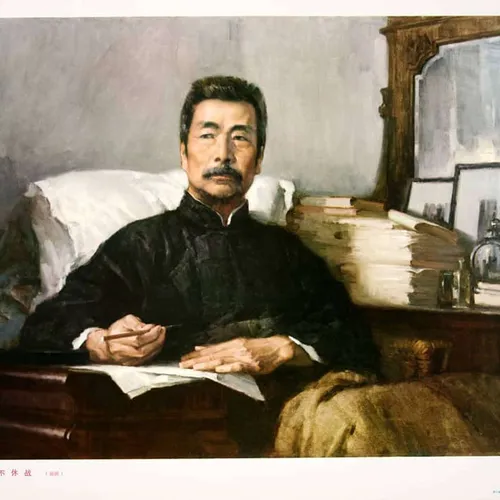
People's History of Ideas Podcast
In this podcast, Matthew Rothwell, author of Transpacific Revolutionaries: The Chinese Revolution in Latin America, explores the global history of ideas related to rebellion and revolution. The main focus of this podcast for the near future will be on the history of the Chinese Revolution, going all the way back to its roots in the initial Chinese reactions to British imperialism during the Opium War of 1839-1842, and then following the development of the revolution and many of the ideas that were products of the revolution through to their transnational diffusion in the late 20th century.
- Update frequency
- every 9 days
- Average duration
- 27 minutes
- Episodes
- 128
- Years Active
- 2019 - 2025

Peasant Revolution?: An Exhausted Mao Rediscovers His Roots
Mao gets sick of all the BS in Shanghai and returns to his hometown of Shaoshan, where he discovers a militant peasantry.
Further Reading:
Stuart Schram, ed., Mao’s Road to Power, vol. 2: National Revo…

Gonzalo in the Middle Kingdom: What Abimael Guzmán Tells Us in His Three Discussions of His Two Trips to China
A podcast version of a recently published article which discusses what the leader of Peru's Shining Path, Abimael Guzmán, has to say about the time he spent in Maoist China.
The article can be read on…

The May 30 Movement: The Chinese People’s Uprising Against the British and Japanese in 1925
Workers, students and merchants in Shanghai take on the British authorities of the International Settlement and Japanese mill owners after protesters are massacred.
Further Reading:
Steve Smith, A Road…

Lenin’s Ideas on Revolutionary Situations and the Situation in the United States Today
In response to a listener request, we consider the situation in the United States today in light of historical thinking on the question of revolutionary situations.
Further reading:
Lenin, The Collapse…

Back to the Labor Front!: The Japanese Mills Strike of 1925
The Communist Party tries to figure out how to put the workers in the lead of the nationalist revolution, and has some initial success.
Further Reading:
Steve Smith, A Road Is Made: Communism in Shangh…

The Proletarian Nation vs. The Theory of the Productive Forces
The thinking of Chinese Communism’s two founders, Li Dazhao and Chen Duxiu, diverges as revolutionary experience is gained.
Further Reading:
Maurice Meisner, Li Ta-Chao and the Origins of Chinese Marxi…

Friends Close, Enemies Closer: The United Front in Action
As both the Guomindang and the Communist Party benefit from their collaboration, tensions build.
Further reading:
Tony Saich, The Origins of the First United Front in China
Steve Smith, A Road Is Made: …

The Road Is Tortuous: The Chinese Revolution and the End of the Global Sixties
A podcast version of a recently published article which argues that the rightward turn of Chinese politics in the 1970s was a key contributing factor in ending the revolutionary era of the long and g…

The Loneliest United Front: The Chinese Communist Party in 1923
The Communist Party of China tries to find a way to implement the united front with the Guomindang in 1923, but ultimately has to wait for the Soviet-Guomindang alliance to mature.
Further reading:
Ton…

Communist Unionizing and the Genesis of the United Front with the Guomindang
The Communist Party begins its labor organizing drive, and the Comintern pushes for a united front with the Guomindang.
Further reading:
Elizabeth Perry, Shanghai on Strike
Tony Saich, The Origins of th…

Workers' Revolution or Nationalist United Front? Early Strategic Decisions of the Chinese Communist Party
The early divergence in strategic thinking and revolutionary priorities between the CCP and the Comintern.
Further reading:
Tony Saich, The Origins of the First United Front in China
Some names from th…

Demarcation and Organization: The Chinese Communist Party is Founded
Polemics with non-revolutionary Marxists and anarchists, and then the party congress in July 1921.
Further reading:
Arif Dirlik, The Origins of Chinese Communism
Some names from this episode:
Chen Duxiu,…

From Russia with Organizational Expertise: The Comintern Comes to China
Gregory Voitinsky comes to China and helps get the ball rolling to found the Communist Party. Also, a few words on commodity fetishism as the keystone of Marx's Capital and how this leads to Lenin's …

The Communist International
Explaining how the strategic thinking of the Communist International developed, as background to the key role the ComIntern played in facilitating the founding of the Chinese Communist Party.

Mao's Anarchist Years (The Young Mao Zedong Part Two)
In this episode we continue our examination of Mao Zedong’s ideological development by discussing his anarchist period.
Further reading:
Stuart Schram, ed., Mao’s Road to Power, vol. 1: The Pre-Marxis…

Liberals Becoming Marxists: The New Culture and May 4th Movements (1915-1919)
In this episode we explore the move from liberalism toward Marxism among progressive intellectuals in the 1915-1919 period, and how those ideas began to be brought to the working class in China’s cit…

The Young Mao Zedong
In this episode we look at Mao Zedong’s childhood, family background, and see what he was thinking in 1912.
Further reading:
Edgar Snow, Red Star Over China
Stuart Schram, ed., Mao’s Road to Power, vol…

The 1911 Revolution
The overthrow of the Qing Dynasty, followed by the first years of the Republic of China.
Further reading on the 1911 Revolution:
Joseph Esherick and C.X. George Wei, editors, China: How the Empire Fel…

Revolutionary Voices from the End of the Qing Dynasty
In this episode, we explore some of the major voices of revolution from the decade preceding the end of the Qing Dynasty in 1912: Zou Rong, Qiu Jin and Sun Yat-sen [Sun Zhongshan].
Some names from thi…

The Boxer Uprising of 1900
In the face of foreign aggression and natural disaster, masses of Chinese people turn to traditional folk religion and martial arts to attempt to throw out the imperialists.
A couple sources for readi…